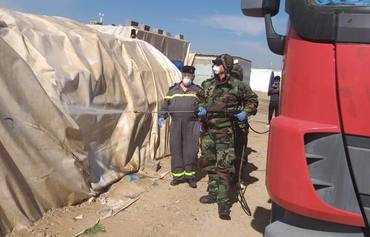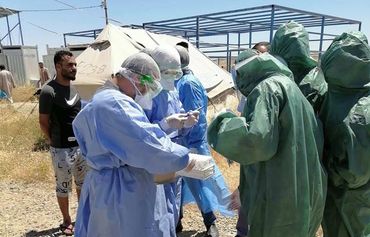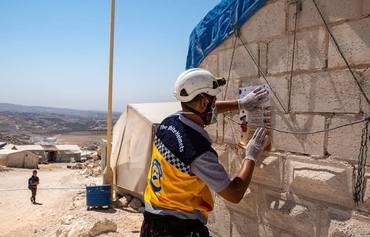The Iraqi government is implementing a series of urgent health measures in displacement camps across the country, aimed at preventing a novel coronavirus (COVID-19) outbreak.
"Health baskets" and medical masks have been distributed, and the camps have been sprayed down with disinfectant, the Ministry of Migration and Displacement said.
The ministry also has been working to educate camp residents about how to protect themselves against the virus, as the global pandemic continues to spread.
Initial health support measures are being rolled out in Dohuk province, which is housing the majority of internally displaced persons (IDPs) from neighbouring Ninawa, the ministry said.
![Health baskets and medical masks have been distributed at a displacement camp in Dohuk. [Photo courtesy of the Ministry of Migration and Displacement]](/cnmi_di/images/2020/03/20/23043-IDPs-Iraq-aid-600_384.jpg)
Health baskets and medical masks have been distributed at a displacement camp in Dohuk. [Photo courtesy of the Ministry of Migration and Displacement]
Three "health baskets" were distributed to each family in the province's 16 camps, which together house more than 30,000 families, said Dohuk department of migration and displacement director Iskandar Mohammed.
The health support plan includes arrangements to distribute medical masks based on the needs of each camp, and to spray down facilities inside the camps with disinfectant, he told Diyaruna.
These measures are being taken to protect public health and ensure the safety of the displaced population, he said, amid growing concerns over the virus's spread.
Cases reported across Iraq
Iraq reported its first coronavirus case -- an Iranian student in Iraq -- on February 22nd, followed by four cases for members of one family with a travel history to Iran, according to the World Health Organisation (WHO).
Case reporting escalated to include almost all Iraqi provinces, the WHO said in a Sunday (March 15th) update, with 83 confirmed cases as of March 12th and eight deaths.
"There is growing concern among the local health authorities about the possibility of domestic transmission of the disease which would challenge the already vulnerable health system in the country, stretched by years of wars and internal crises," the WHO said.
"The health authorities have already banned major public events, suspended schools, and closed malls and gathering places until March 21st."
The Iraqi government also announced bans on non-Iraqi travellers coming from around a dozen countries facing outbreaks, AFP reported March 14th.
Iraq has been particularly worried about a spread of the virus from neighbouring Iran, which has been one of the worst-hit countries.
As cases continue to rise, the Ministry of Migration and Displacement plans to organise awareness-raising sessions to educate camp residents about ways to protect themselves from the virus and prevent it from spreading in the camps.
The ministry is working with the Ministry of Health to form mobile medical teams, according to Ali Abbas, director general of the ministry's branch affairs department.
These teams will visit all Iraqi displacement camps and present educational materials on COVID-19 prevention, he told Diyaruna.
He said these teams also will spray disinfectant and sterilize all camp facilities to safeguard public health.
Camps in urgent need of support
The displaced population is in urgent need of health support to prevent the spread of viruses and disease, said Suleiman Eido, mayor of the Khanki camp in Dohuk Suleiman.
The tents lack the most basic health safety requirements, he told Diyaruna, pointing out that the displaced population is much more vulnerable than residents of more stable communities.
He warned that a single infection in the camps would mean the virus could spread to hundreds and possibly thousands of IDPs, due to the close contact among them and the use of shared facilities.
Eido called on the authorities to establish fixed health centres inside the camps that will be able to respond to any health emergencies and isolate any residents who become infected.
In addition to health care measures, he said, the authorities must ensure security checks are carried out, to ensure IDPs who travel outside the camp or country, especially to Iran, inform the relevant authorities upon their return.
Eido praised the IDPs for having a sense of responsibility and abiding by the medical instructions given to them to fight this health threat.

![A team from the Dohuk branch of the Ministry of Migration and Displacement distributes health baskets in a displacement camp. [Photo courtesy of the Ministry of Migration and Displacement]](/cnmi_di/images/2020/03/20/23041-Coronavirus-Iraq-IDPs-600_384.jpg)






